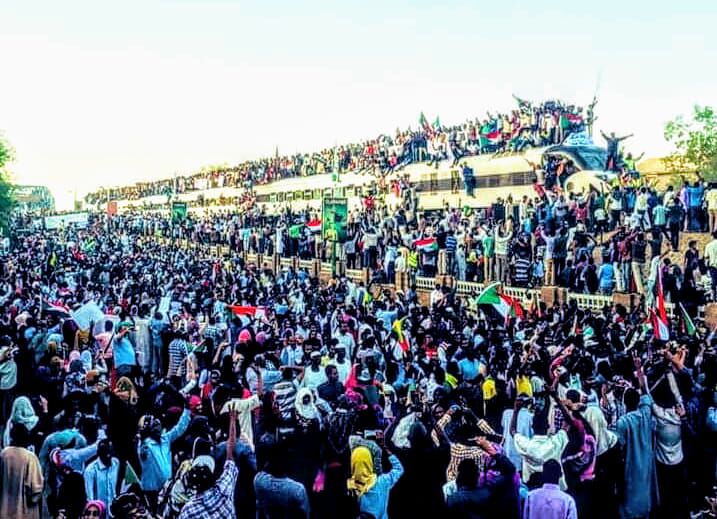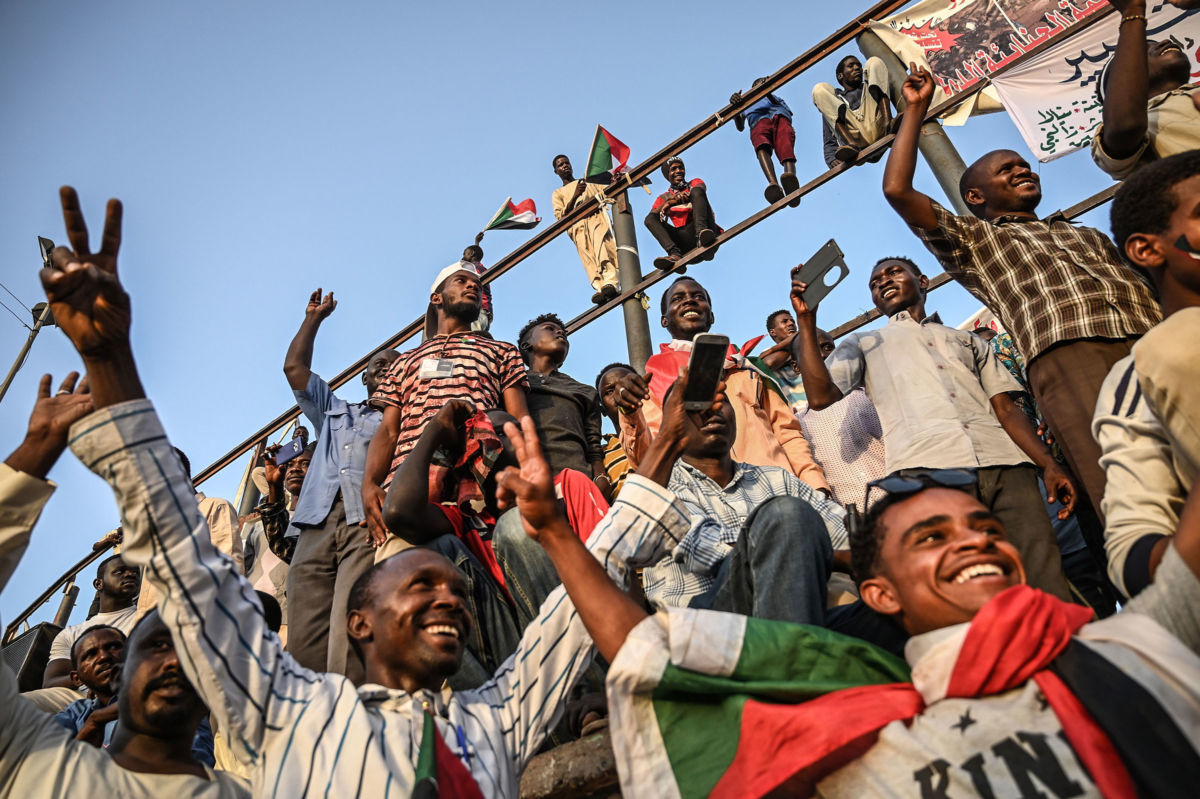Honest, paywall-free news is rare. Please support our boldly independent journalism with a donation of any size.
The revolutionary process in the Middle East and North Africa continues to unfold as uprisings in Sudan and Algeria have defied the counterrevolutionary wave that swept across the region following the 2011 Arab Spring.
In Algeria, a sustained protest movement toppled authoritarian leader Abdelaziz Bouteflika on April 2 of this year. About a week later, ongoing popular resistance in Sudan forced out ruler Omar al-Bashir. In both countries, the military remains in power, though the heads of the regimes are gone.
The uprising in Sudan has benefited from a high level of organization and impressive leadership from students, women and unions. Since the fall of al-Bashir, the Transitional Military Council is attempting to consolidate power with the full backing of regional and international powers. But protesters remain committed to continuing the uprising until the old regime is completely transformed. Their struggle is a beacon of hope and inspiration for all those fighting for freedom.
Mohamed Mustafa Diab is a Sudanese doctor and activist born and raised in Khartoum. Currently living in the U.S., Diab returned home in January to participate in the uprising. He spoke with Truthout about the protest movement and the future of Sudan. The following transcript has been lightly edited for clarity and length.
Emma Wilde Botta: Omar al-Bashir became president of Sudan following a military coup in 1989. In his 30-year rule, how did he attempt to structure the country?
Mohamed Mustafa Diab: Bashir’s regime systematically monopolized the job market, investments and political power. They controlled the civil service, judiciary system and, of course, executive bodies. Political affiliation to the ruling National Congress Party became more important than professional merit. I know many highly qualified Sudanese people, pioneers in their fields, who were forced to retire, not for opposing the regime, but simply because they did not enthusiastically support the regime.
The amount of corruption is unbelievable. Sudan ranked 170th out of 176 countries in Transparency International’s 2018 corruption perceptions index. According to some estimates, over 60 percent of gold — the country’s main export — is smuggled abroad with the help of top government officials. We were once home to the largest irrigation project on the continent — a 2.2 million-acre Gezira agricultural scheme — but corrupt policies allowed it to crumble in the early 1990s.
Bashir felt no shame in selling anything and everything, even Sudanese citizens. Over the past five years, there have been as many as 15,000 Sudanese fighting in Yemen. The regime has received billions of dollars from Saudi Arabia for these soldiers, who are mostly young boys from marginalized communities. These boys are offered as little as $500 to go and fight. That’s how little their lives are worth.
Wow. That helps explain why Saudi Arabia has attempted to maintain the status quo in Sudan. Historically, how have other countries related to Sudan?
Sudan is a vital country. We have a waterfront with the Red Sea, seven land borders, 25 percent share of the Nile water and about 200 million acres of arable land. At one point, we were producing 80 percent of the world’s gum Arabic. We have gold, other minerals, oil — the usual story.
To no one’s surprise, it is not just Sudanese people who have a hand in the country. In the past, the U.S., Israel and Egypt were the main players. More recently, Qatar and Turkey established strategic partnerships with the government of Sudan in competition with Saudi Arabia, the UAE [United Arab Emirates] and Egypt. Immediately after Bashir was overthrown, Saudi Arabia and UAE pledged $3 billion.
Bashir’s regime turned Sudan into a backyard for other countries to exploit. Our politicians bent over backwards to offer favorable financial deals. Collectively, foreign states own over 2 million arable acres in Sudan through 99-year leases with minimal-to-no strings attached. I remember in primary school, we would recite “Sudan is the world’s breadbasket.” I think Arab policy makers were reciting that with us.
Bashir was forced out of office on April 11 after months of protest. Did his fall come as a surprise to you?
His fall was inevitable. Sooner or later, dictators fall. Bashir came to power in a military coup that ousted a democratically elected prime minister. Throughout his 30-year rule, there was continuous resistance, armed and unarmed, from the people.
I have yet to encounter a Sudanese person who hasn’t been tear-gassed. Students were the driving force of the revolution today and thousands of demonstrations in the past. The regime understood the threat that student movements represent and responded, brutally, to any sign of revolt. During my years in university, it was usual to see the security apparatus militias roaming around campus beating and apprehending students.
My university was shut down twice by Bashir due to fear of student protests growing into popular ones. Since independence in 1956, we’ve had only nine accumulative years of democracy. We should not and will not accept any more military dictatorships.

Since Bashir has fallen, the Transitional Military Council has been in power. How has the movement responded?
When the military first took power, myself and others were worried the uprising would be stolen by the guards of the old regime. Today, I feel more optimistic. People are not leaving the streets until there is a civilian-controlled government. The Sudanese people understand that the enemy is not a single man; it is the whole regime and everything it represents.
There has been a sit-in since the military council took power. Millions of people are participating. There are campaigns to raise awareness about what we want, how to move forward, how to learn from our mistakes and the mistakes of countries around us. Every day, people are leading seminars and workshops.
The level of awareness and consciousness is amazing, even among the very young. There was an incredible Facebook Live video of a teenager building a barricade at the sit-in. He said, “My dreams, my hopes, my everything is on this barricade. I am not leaving until we have a civilian government.” That’s why I’m optimistic.
What are some of the lessons of this uprising?
I think this revolution is historic. Sudan is a war-torn African country with over 140 ethnic groups, and many different religions; yet this revolution brought people together. In the past, the regime was able to successfully exploit these ethnic/religious differences, turning similar demonstrations into Darfurians/Southerners vs. Northerners, Blacks vs. whites, Muslims vs. Christians. But this time, when they tried to turn people against Darfurians, it didn’t work. One of the first chants was “Ya onsori wa maghroor, kol albalad Darfoor!” which means “Hey racist [Omar Al-Bashir], we are all Darfur!”
The regime kept trying to draw people into violence, but the main slogan of this movement has been that it’s peaceful. Everyone is fueled by the spirit of the revolution. Even after a civilian government forms, I hope that we can turn the sit-ins into a social situation and have them be the new norm.
You feel the happiness on people’s faces, everyone is learning something new, everyone has a role to play, even those of us abroad. The Sudanese diaspora has raised over half-a-million dollars in the past four months.
The most immediate question is the composition of the government. The Transitional Military Council has rejected the protesters’ demand for a fully civilian government which would significantly alter the political power of the military. Where do things stand now?
“A civilian government or an eternal revolution.” That is one of the most popular slogans right now. As long as we maintain pressure, we — the Sudanese people — will have the final say. The National Congress Party’s “deep state” that underpinned Bashir’s rule is working day and night to hinder the transition to civilian rule.
The protesters understand the importance of unity in this critical time. Despite constant smear campaigns against its members, the Freedom and Change Alliance — a coalition of groups including unions, professional associations, feminist organizations and political parties — has successfully united protesters.
The message is simple: No one is going home until we have a civilian-controlled sovereign ruling body and a civilian government. The African Union, which is headed by Abdel Fattah el-Sisi, the military dictator of Egypt, has granted the military council two months to cede power. They are trying to prolong the negotiations in the hopes that people will get tired and go home.
Sudan is inspiring protests beyond its borders. As we speak, there are demonstrations in Chad against Idriss Déby, who has ruled the country for 30 years. People are chanting: “Just fall, that is all!” Freedom is contagious. That’s what dictators are afraid of.
For those able, please consider donating to the University of Khartoum Alumni Association USA’s fundraiser. Funds will go toward food, water, medical care, large tents and other supplies to support the sit-in protest in Khartoum.
Trump is silencing political dissent. We appeal for your support.
Progressive nonprofits are the latest target caught in Trump’s crosshairs. With the aim of eliminating political opposition, Trump and his sycophants are working to curb government funding, constrain private foundations, and even cut tax-exempt status from organizations he dislikes.
We’re concerned, because Truthout is not immune to such bad-faith attacks.
We can only resist Trump’s attacks by cultivating a strong base of support. The right-wing mediasphere is funded comfortably by billionaire owners and venture capitalist philanthropists. At Truthout, we have you.
Truthout has launched a fundraiser, and we have only 72 hours left to raise $24,000. Please take a meaningful action in the fight against authoritarianism: make a one-time or monthly donation to Truthout. If you have the means, please dig deep.
